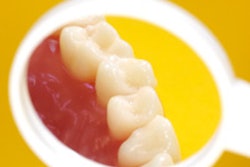A drug now used to treat intestinal worms could protect people from periodontitis, according to a new study in Antimicrobial Agents and Chemotherapy (October 28, 2013).
Current treatment for periodontitis involves scraping dental plaque off of the root of the tooth. And despite this unpleasant and costly treatment, the biofilm frequently grows back.
But Australian researchers showed in an animal model of periodontitis that the drug oxantel inhibits this growth by interfering with an enzyme that bacteria require for biofilm formation. Oxantel effectiveness was shown in a dose-dependent manner.
The researchers began their search by studying the symbioses of the periodontal pathogens, using genomics, proteomics, and metabolomics, in animal models of periodontitis. They soon found that the periodontal biofilm depended for growth on the availability of iron and heme (an iron-containing molecule related to hemoglobin), and that restricting these reduced levels of the enzyme, fumarate reductase. Since oxantel was known to inhibit the enzyme in some bacteria, they then successfully tested its ability to inhibit fumarate reductase activity in Porphyromonas gingivalis, one of the major bacterial components of periodontitis biofilms. Fumarate reductase is not found in humans, making it an ideal drug target.
The researchers also showed that oxantel disrupted the growth of polymicrobial biofilms containing P. gingivalis, Tannerella forsythia, and Treponema denticola, a typical composition of periodontal biofilms, despite the fact that the latter alone is unaffected by oxantel.
The researchers found that treatment with oxantel downregulated six P. gingivalis gene products, and upregulated 22 gene products, all of which are part of a regulon (a genetic unit) that controls availability of heme.



















